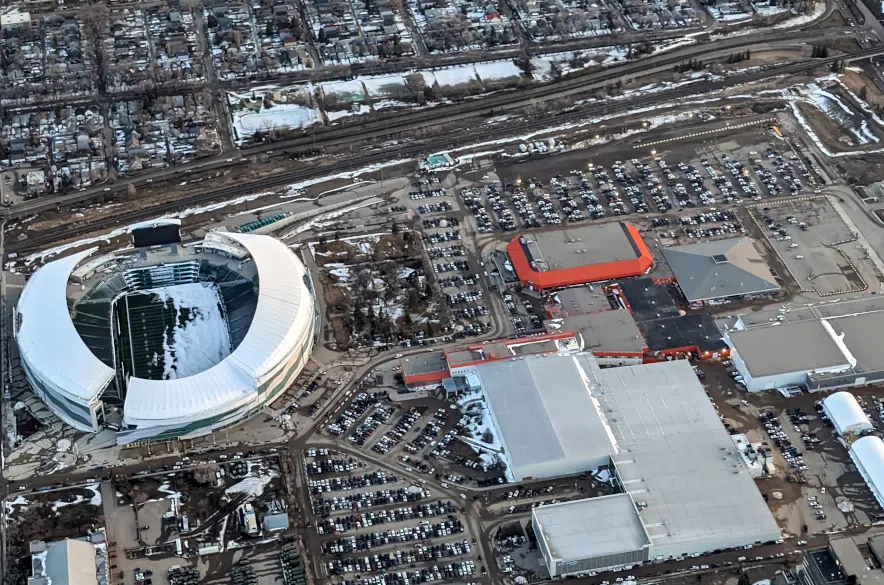The Regina Exhibition Association Limited (REAL) is getting help paying back a federal loan from the City of Regina.
On Wednesday, council unanimously decided to assist REAL in repaying its Canada Emergency Wage Subsidy – a federal program designed to help struggling businesses retain employees during the COVID-19 pandemic.
REAL owes $8 million to the Canada Revenue Agency (CRA) following a CRA audit that determined it was not eligible for the subsidy.
Economic Development Regina (EDR) will also be getting help from the city, as it owes about $917,885 to the CRA, also through the wage subsidy.
Council decided to provide $8 million to REAL and $667,885 to EDR. EDR is contributing $250,000 to the repayment.
Mayor Sandra Masters acknowledged that the situation isn’t ideal, but felt council’s hands were tied.
“I’m not sure there’s much of a choice when it’s Canada Revenue Agency,” she told reporters after the meeting.
“They came back and said it has to be repaid, so I don’t think the City of Regina has much leeway when it comes to paying that off.”
During the meeting, representatives of both REAL and EDR argued that they pursued the funds in good faith and utilized them for the benefit of the city.
Chris Lane with EDR said that organization lost $700,000 in partner revenue during the pandemic – a fact he says is undisputed by the revenue agency.
EDR made its case to the CRA in October, but was issued notice about its ineligibility the following month.
Lane said one of the deciding factors for eligibility is determining if a company is publicly owned.
“Our position was – and is – that while we work closely with the city, we’re not-for-profit, we have an independent board and we also noted that EDR receives funding from multiple sources, not just the city,” Lane said.
Lane said that EDR must pay as a result of the Unanimous Membership Agreement between it and the city.
Lane added that EDR used the funds for the betterment of industries it is mandated to support, including agriculture, food and tourism.
Roberta Engel, acting president of REAL, said like EDR, REAL was challenged over whether or not it was an eligible employer.
“We became a source for our community to support the fight against COVID-19 and to be a very key provider of programming that allowed the residents of the city of Regina to participate in activities that were, in that point in time, very imperative to maintaining our health and wellness within the city,” she said.
Engel said REAL looked at all available funding sources throughout the pandemic and applied to three federal programs, three provincial programs and took advantage of payment deferral programs for utilities.
According to a leaked city memo, REAL used the wage subsidy funding to help keep operations open during the pandemic, as well as for the Saskatchewan Health Authority’s drive-through COVID test centre, its drive-thru vaccination clinic and its emergency field hospital.
READ MORE:
- Council passes 2024 Regina budget in abrupt ending to deliberations
- REAL’s troubles and a surprise deficit discussed by finance committee
“I think everybody associated with this is kind of frustrated because at the time during COVID, as you know, it was incredibly unpredictable,” Masters said.
“… at the end of the day, repay it and we’ll continue to deal with the effects of COVID, I suppose, for probably another couple years.”
Lane said EDR’s GST rebate of $11,000 has also been applied to its debt balance.
Another $230k going to REAL
Council also approved a payment to REAL over a separate matter on Wednesday. It approved $232,259 to REAL to cover the costs of work it did for the city’s catalyst committee.
The money was initially meant to be paid through the city’s 2023 general operating fund.
Deputy city manager Barry Lacey said the payment appeared to have slipped through the cracks.
“I don’t have any specific explanation about why we had those misses but I think there were at least a couple of misses around that piece,” he said.
“Ultimately, we all know the work was done. It was good work around that piece and the expenses need to be paid by someone – we think most appropriately by the city.”
Last fall, council decided to absorb Tourism Regina from REAL and voted to replace REAL’s board as it considered dissolving it altogether.
General fund reserve
Council also decided to transfer $8 million from the Fleet Reserve to the general fund. It’s the same fund that would grant money to REAL and EDR.
In April, it was revealed that the 2023 general operating fund was at a deficit of around $2.7 million instead of a projected $1.7 million surplus.
This came from an apparent accounting error that was discovered after the city initially released its report ahead of an Audit and Finance Committee meeting.
Regina is required to balance its budget in accordance with the Cities Act.
The city is set to discuss possible ways to reallocate funds in order to balance the operating fund.
The general fund reserve’s minimum recommended balance is $23 million, and the maximum is $46 million.
In light of all the approved payments, the city says the reserve is now around $7.1 million.











